

One
More
Day


Answer: C.
Americans most identify with the Griswold family – and bumbling dad Clark Griswold, played by Chevy Chase – from National Lampoon’s Vacation series, according to a TripAdvisor survey. The Pritchetts, from TV’s Modern Family, came in second

Close


When travelling with loved ones, American families identify most with which fictional family?





A. The Simpsons
B. The Bradys
C. The Griswolds
D. The Cleavers


Answer: False.
The average U.S.
workweek is 41 hours,
which is three hours
longer than Britain's,
according to a 2014 study.

Next


True or false:
Britain's workweek
is longer than America's?


True
False



Next

Answer: A.
On vacation, families
eat twice as many meals
together as than they do
when at home, according
to a Disney survey.


How many more meals do families eat together while on vacation versus when they're at home?

A. Twice as many
B. Four times as many
C. About the same number
D. Slightly fewer






Answer: C.
62% of Americans said
that they were not going
to take a vacation during
the summer, according to
Skift, a travel industry news
and data site.

Next


A survey conducted in
April asked Americans
whether or not they planned
to take a vacation during
the summer. How many said
that they would not be
taking a trip?

A. About 20%
B. Around 40%
C. Roughly 60%
D. More than 90%




Are You "Climbing The Ladder"
Into A Hole?
On average, Americans take less time off than they’ve earned.
This predilection is taking a toll not just on workers, but also on our families and the economy.
Wouldn’t it be great if we could take just one more day?

Nat Wasserstein
thought education travel sparked greater interest in what they were taught in school.
More than half of children who traveled received better grades.
57% of people who traveled as children went to college.
Adults who went on domestic education trips during their youth earn $5000 more or 12% greater income than those who took no trips.
‹›click arrows for more1234 Source: TravelEffect.com
It’s a similar story for most working people in the U.S. Whether you’re a middle manager, a serial entrepreneur or a health-care worker, Americans don’t have enough time to be with their families. It’s only on vacation that we enjoy the luxury of leisure — the ability to spend a block of uninterrupted time with family and friends.

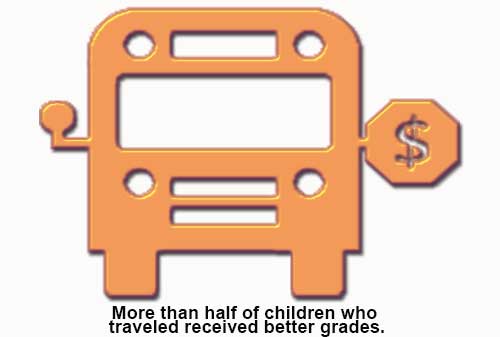









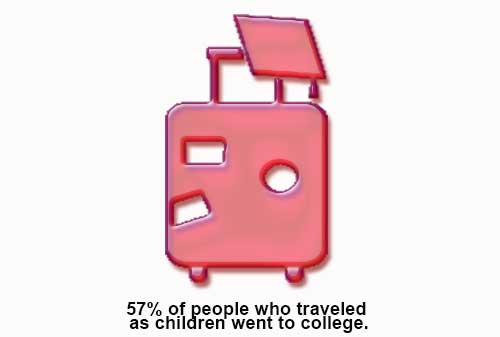




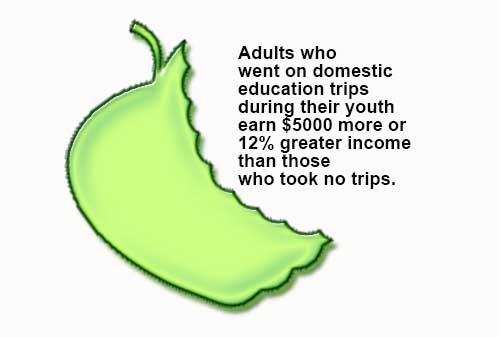







Yet most of us don’t even use all of the vacation days we’re entitled to. A February 2014 report by Oxford Economics found that a quarter of American workers don’t get any paid vacation, and those whose jobs do include paid time off leave 3.2 days of vacation on the table, on average.
It’s perhaps not surprising, then, that only half of Americans have planned a vacation or been on one in 2014, according to a survey by MasterCard.
If people did take all those days off — or even just one more than they currently do — Americans would be a happier bunch, says Wasserstein. “Going away with my family is one of the most important things I do,” he says. “My life would be a lot less fulfilling if I wasn’t able to take time out with my kids.”
Family time
In April 2013, Kelton Global, a Culver City, Calif.-based business consultancy, conducted a survey that looked at how families spent time together on vacation versus at home.
Of the 1,000 or so parents who participated in the survey, three-quarters agreed that the family is more relaxed while on vacation. They also reported that their families eat twice as many meals together during those times. And while they considered less than half of family time at home “quality time,” that share rose to 82 percent when the family on break together.

The Kelton Global survey also found that 78 percent of Americans would give up their favorite TV show to spend just one more hour with their children every week, while 71 percent of parents said they would love to spend nine more hours with their kids every week.
Lisa Orndoff, manager of employee relations and engagement at the Society for Human Resource Management (S.H.R.M.), isn’t surprised by these numbers.
From talking to employees, she knows that most would love to spend more time with their families. “I hear a lot of things, like they’re going to miss soccer games, or they’ve missed the last recital and don’t want to miss this one,” she says. Work- and home-life often come into conflict: “There’s more pressure to be a present parent and also to deal with our crazy work schedules.”
If vacations are one of the few times people can unplug and be fully present with their loved ones, why don’t employees take their allotted time off?
Oxford Economics found that 40 percent of employees don’t take all of their vacation days because they have too much work to do. If they take a break, they worry about how that work will get done and what their employer will think of them if they don’t complete their projects.
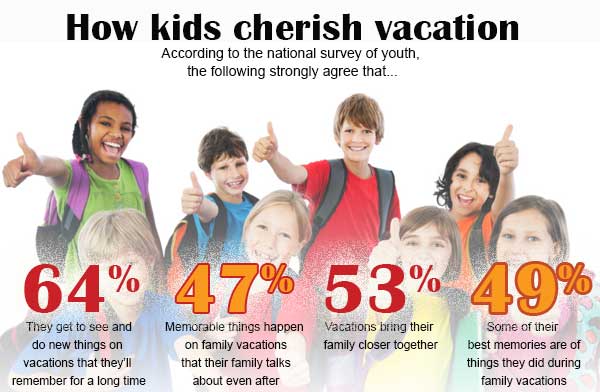

Economic toll
But taking a family vacation isn’t just good for families. It’s also an essential boost for America’s economy.

Oxford Economics found that if we all took every vacation day available to us, it would spur $67 billion more in additional spending and roughly 288 million additional travel days. Add in family members to the mix and more than 580 million additional travel days would be generated.
If more people traveled, industries well beyond familiar travel players would feel the economic lift too. Air carriers, restaurants and hotels would be direct beneficiaries, but the Oxford Economics report also found that travel stimulates demand for services — such as travel agents, legal help and financial planners — along with spending on everything from cameras to clothes to entertainment and food.
Taken together this fillip to spending would result in an even larger gain: roughly $160 billion in incremental business sales across the U.S., as well as $52 billion in additional wage income. Longer and more consistent vacationing would also add some 1.2 million jobs as companies hire staff to fill in for vacationing employees, while other businesses add workers to serve those vacationers.


































100

90

80

70

60

40

30

20

10











Italy

France

Japan

China

Germany

Denmark

Austrailia

Spain

Puerto Rico

Switzerland

ACTION

ACTION

ACTION

ACTION

ACTION

ACTION

ACTION

ACTION

ACTION

ACTION



Sector

Gender


Overall


Additional Stats
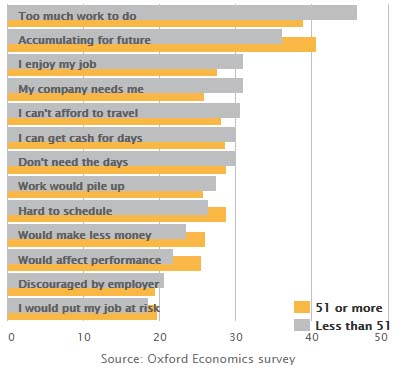
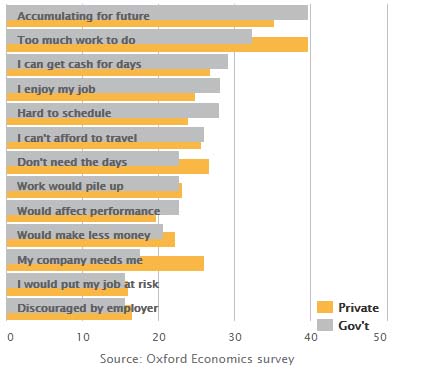
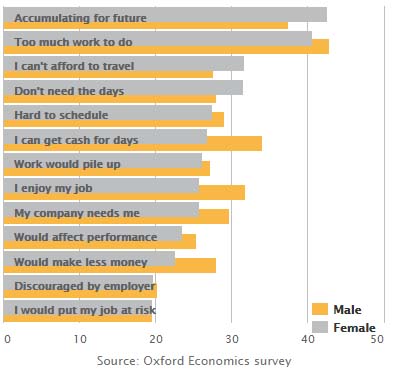
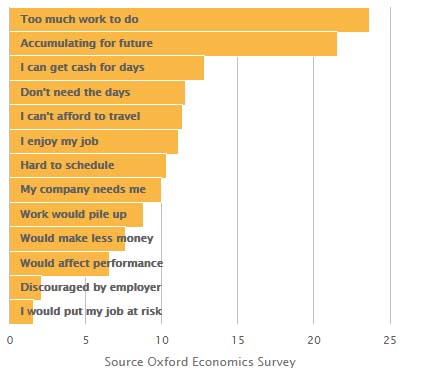

50

It’s partly for this reason that John Schmitt, an economist at Washington’s Centre for Economic & Policy Research, thinks America should mandate paid time off. Currently, there are no U.S. laws requiring paid vacation to be offered or taken.
“When you’re on vacation, you spend money in a different way than when you’re at work,” he says. “Many industries would benefit from more time.

Vacation Nations
Paid vacation and paid holidays, in working days

Productivity paradox
In some ways, American culture is holding us back, says Tony Schwartz, president and chief executive of The Energy Group, a Yonkers, N.Y.-based company that works with businesses to create a healthier and happier workplace. A “work until you drop” attitude is pervasive in many organizations, Schwartz says.
This way of thinking persists even as study after study confirms that taking time off makes people more productive as well as much happier and far less stressed. According to a 2013 S.H.R.M. report, 74 percent of human resource managers said that employees who take vacation have higher levels of job satisfaction, and 72 percent are more productive. Oxford Economics found that 60 percent of employees feel better mentally after a vacation, and 59 percent said taking time off improved their family lives.
Orndoff has seen firsthand how much more relaxed employees are after spending time away with family. “It creates space in their heads,” she says. “People get breathing room. They get to experience different things, and they’re re-energized when they come back to work.”
With Wasserstein’s oldest child now away at college, his vacation time is, in some ways, even more precious than it was before. Now vacation-time the only period when the entire family gets to spend a chunk of days in each other’s company.
If Wasserstein has his way, he’ll be taking family vacations, even as his kids have their own families, for many years to come. “I’m going to put all of my energy into trying to make these trips happen,” he says. “Now, though, the kids have a lot of other things to do rather than go on vacation with their parents. I’ll just have to make our trips even more interesting.”

Reasons for not taking all entitled vacation
% or respondents, multiple answers permitted.
